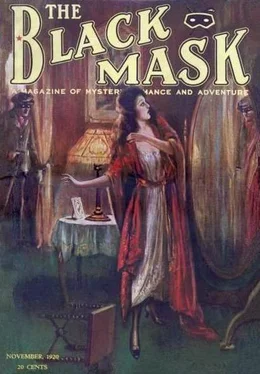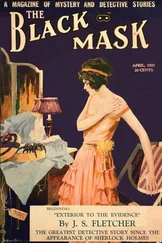Hamilton Craigie - The Black Mask Magazine (Vol. 2, No. 2 — November 1920)
Здесь есть возможность читать онлайн «Hamilton Craigie - The Black Mask Magazine (Vol. 2, No. 2 — November 1920)» весь текст электронной книги совершенно бесплатно (целиком полную версию без сокращений). В некоторых случаях можно слушать аудио, скачать через торрент в формате fb2 и присутствует краткое содержание. Город: New York, Год выпуска: 1920, Издательство: Pro-distributors Publishing Company, Жанр: Классический детектив, на английском языке. Описание произведения, (предисловие) а так же отзывы посетителей доступны на портале библиотеки ЛибКат.
- Название:The Black Mask Magazine (Vol. 2, No. 2 — November 1920)
- Автор:
- Издательство:Pro-distributors Publishing Company
- Жанр:
- Год:1920
- Город:New York
- ISBN:нет данных
- Рейтинг книги:5 / 5. Голосов: 1
-
Избранное:Добавить в избранное
- Отзывы:
-
Ваша оценка:
- 100
- 1
- 2
- 3
- 4
- 5
The Black Mask Magazine (Vol. 2, No. 2 — November 1920): краткое содержание, описание и аннотация
Предлагаем к чтению аннотацию, описание, краткое содержание или предисловие (зависит от того, что написал сам автор книги «The Black Mask Magazine (Vol. 2, No. 2 — November 1920)»). Если вы не нашли необходимую информацию о книге — напишите в комментариях, мы постараемся отыскать её.
The Black Mask Magazine (Vol. 2, No. 2 — November 1920) — читать онлайн бесплатно полную книгу (весь текст) целиком
Ниже представлен текст книги, разбитый по страницам. Система сохранения места последней прочитанной страницы, позволяет с удобством читать онлайн бесплатно книгу «The Black Mask Magazine (Vol. 2, No. 2 — November 1920)», без необходимости каждый раз заново искать на чём Вы остановились. Поставьте закладку, и сможете в любой момент перейти на страницу, на которой закончили чтение.
Интервал:
Закладка:
“I’ll break you yet, boy—I’ll grind you under my feet—”
That was Black Michael’s threat when he sought to resist the big-fisted, rum-loving skipper. Then followed the first flogging, stripped and lashed to the beam...
The recollection of it was gall in his mouth.
After that life for him consisted chiefly of two things: the lash and rum — the whip to break his body, the liquor to break his brain. These were linked by labors so offensive, so repellent that he welcomed the hours of drunken sleep when for a brief while his senses were drowned in oblivion. In all this darkness there were two candles: the friendly attitude of the first mate and the queer companionship of the brig’s mascot, Kerachi, a Rajputana parrakeet.
Before the vessel reached the white coral walls of Papeite, Black Michael demonstrated that he could keep a threat; The Boy was broken; the slender thread between strength and weakness snapped... like the string of a fine instrument struck by brutal hands; and when the Libertine cast moorings in the blue lagoon of the Tahitian capital he was still aboard, with a bruised body and a bruised mind, knowing in his tortured heart that some day, when the courage was given him, he would kill the master of the brig.
From Tahiti the ship passed through the coral traps of Les Isles Dangereux, sailed around the low archipelago into the phosphorescent waters of the Marquesas... to Hiva-oa; and there, in Atuona Valley, he received the gift of courage—from The White Lotus.
Three days ago—the one time he had gone ashore—he had seen her clinging to the door-frame of a thatched bamboo dwelling. “Old Babache’s kid... a leper,” he heard someone say.
And she had smiled at him.
An hour after that, when the longboat was putting away from the beach, and the tawny maidens of Hiva-oa ran out waist-deep in the green bay to wave farewell, she was there, her gold hair falling like glinting fire about her pale, spray-dashed face.
“Ia ora na i te Atua...”
With the Marquesan girls she sang that farewell—this White Lotus that he had found dying in the mulch of the South Seas...
The sight of her was to him a light that pierced his poisoned, vapor-clung brain. And because he had seen her, this pallid leper-child, he knew that the hour had arrived when the master of the Libertine must pay the penalty for having murdered his soul.
Yet what would she think if she knew? But she would never know. Hiva-oa, dreaming its eternal dreams beneath the brooding thunders of Temetiu, had already slipped into the past—and in its dreams she lay, a part of them.
He shuddered again. Yes, he would kill Black Michael. He was below in his bunk now—drunk, as usual. With the skipper gone, the first mate, Cardigan, would come into command—and then...
He crept across the wet deck and down the companionway.
A door in the rear of the lazarette, which was just off the main cabin, admitted him to a passage amidships, beneath the deck, leading forward to a space in the fo’castle where he and five others of the crew bunked.
In the bulkhead door he paused. A sooty slush-lamp, swung from the blackened beam, cast sluggish light upon six bunks arranged in double tiers along the bulkhead. It was a foul place, reeking of vile sea odors.
Two of the bunks were occupied. The lower tier of one supported the hulking body of a bullet-headed mulatto, clad only in short breeches, while above him lay the boatswain, a Creole from New Orleans. They were both asleep and breathing heavily.
Thrusting the weapon under his belt, he retraced his steps along the passage amidships and in the gloom of the main cabin groped toward Black Michael’s quarters.
A terrible fear laid frigid fingers upon his heart as he reached the door. For a full minute he stood transfixed to the spot, his breath caught in his throat; then he grasped the knob, turned it and the door swung open.
Within, the closed porthole—a pale eye of dread—stared at him. The air was close—tainted with rum... and human flesh. He listened for the sound of breathing, but only the monotonous murmur of the bilge water and the creak of straining timbers could be heard.
He drew the knife from beneath his belt—
The leper child came to him then... a blinding flash of spiritual pallor, the shining recoil of his-dead self that sprang through the darkness of his soul and smote him paralyzed for the moment.
But Black Michael must die.
He reached the bunk; looked down upon the indistinct, sprawling figure. A wave of hysteria swept him, swamping his courage. He wanted to run, to throw himself upon his mattress and weep out the sorrows that twisted his heart. But—
... A swing of the blade, a Sickening sound... and it was finished. He never released his grip on the hilt; held it as though it were a member of his own body; withdrew it and fell against the door.
For some time he lay with his shoulders pressed to the panels, at bay, facing the specter of himself; but when at length the fear-paralysis released him, he burst out of the door, closed it, raced through the main cabin and up the companionway.
The air on deck seemed to lift from his brain the mantle of a loathsome vapor. Here in the tropic moisture of the night, where the wind swelled amongst the waving spars, his reason returned, swept over him like a cold and shuddersome flood.
He glanced fore and aft. The decks were deserted but for a lone figure on the poop deck. The watch—he could recognize him—a form planted as a piece of statuary upon the wheel-grating.
He slunk past the forward hatch and climbed the ladder to the fore-poop. A stinging spray, flung over the bowsprit by a long gust of wind, struck his face sharply. It seemed to awaken him to the fact that he still gripped the knife, and with a shudder of repulsion he let it fall to the deck planks. For an instant he stood above it, looking as one fascinated upon the glinting thing; then he touched it with his bare foot... shivered... and pushed it across the deck until it disappeared over the bow...
A sobbing breath was drawn from his throat. He turned and fled down-deck—as one pursued by the horrors of the nethermost hell.
Upon reaching his quarters he found the mulatto and the Creole still asleep; the slush-lamp hung from the blackened beam, swaying with the heave of the brig.
A chill started him to trembling and he knelt beside his bunk, removing a flask from beneath the mattress. As he lifted it to his lips a sound behind him made him pause with it in mid-air.
“Get below, you dirty lubbers!... Bahdsoodai! ..”
He turned his head sharply. Neither the mulatto nor the Creole had altered his position—but perched upon the beam was a feathery green body. His rigid muscles relaxed as he recognized Kerachi, his friend, the Rajputana parrakeet.
He raised the flask to his mouth. The vile Tahitian rum was like vitriol, searing a path from his throat to the pit of his stomach. It choked him, but when he ceased coughing he took another gulp—another...
“Step lively, lads!... Adrushtam!... Two bells, mate!”
Two bells. Those words startled him. That was just before he—
He shuddered; swallowed quantities of the liquid fire; drained the bottle and fell with his face buried in the reek of the mattress. The flask slipped from his nerveless hand—struck the floor with a distant thud.
“O, God—” he moaned. Hot tears burned his cheeks as he lay there sobbing in the awful abandonment of drunken grief.
“All hands aft!” shrieked the parrakeet, then began to swear in Hindustani and Mandarin. That was the last thing he heard, the grotesque profanity of the little bird. Like a barque severed from its mooring-lines, his brain was carried downstream on the current of slumber...
Читать дальшеИнтервал:
Закладка:
Похожие книги на «The Black Mask Magazine (Vol. 2, No. 2 — November 1920)»
Представляем Вашему вниманию похожие книги на «The Black Mask Magazine (Vol. 2, No. 2 — November 1920)» списком для выбора. Мы отобрали схожую по названию и смыслу литературу в надежде предоставить читателям больше вариантов отыскать новые, интересные, ещё непрочитанные произведения.
Обсуждение, отзывы о книге «The Black Mask Magazine (Vol. 2, No. 2 — November 1920)» и просто собственные мнения читателей. Оставьте ваши комментарии, напишите, что Вы думаете о произведении, его смысле или главных героях. Укажите что конкретно понравилось, а что нет, и почему Вы так считаете.












